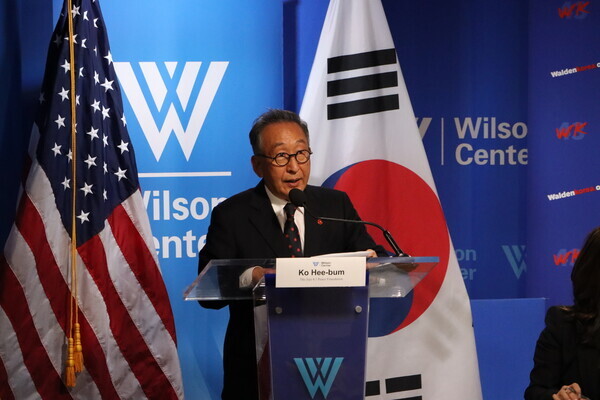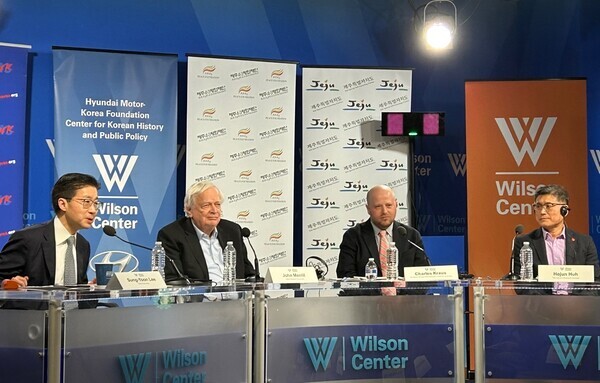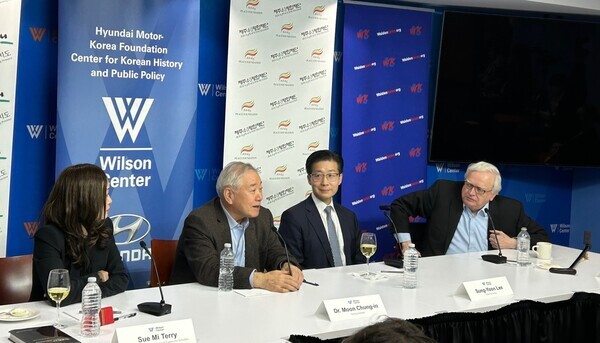hankyoreh
Links to other country sites 다른 나라 사이트 링크
Time for US to acknowledge, apologize for role in bloody Jeju April 3 Incident, argue experts

“The time has come for the US to face the truth about the Jeju April 3 Incident. That will make its relationship with South Korea healthier and stronger.”
A symposium was held in Washington, DC, where experts asked that the US take responsibility and apologize for its involvement in the Jeju April 3 Incident as a way of reckoning with this painful episode in the two countries’ history.
The Jeju April 3 Incident refers to a violent period on the Korean island of Jeju that extended between March 1, 1947, through an uprising on April 3, 1948, and in the form of bloody suppression by government forces for years after.
The Jeju 4.3 Peace Foundation, Jeju Island and the Wilson Center organized a symposium called “US-Korea Relations: Retrospective on the Jeju April 3 Incident, Human Rights and Alliance” on Thursday at which speakers from Korea and the US argued that the US was undeniably involved in and responsible for the Jeju April 3 Incident. They said that since the South Korean government has already carried out an investigation, made an apology, provided compensation and held retrials to exonerate the victims, it’s time for the US to take action.
“The Jeju April 3 Incident began under the oversight of the US military government 74 years ago and continued under the control of the Korean Military Advisory Group following the establishment of the South Korean government,” said Ko Hee-bum, chairman of the Jeju 4.3 Peace Foundation, in opening remarks that day. Ko explained that 30,000 people lost their lives and that 140,000 of their relatives are still suffering today.
“Victims’ families and the people of Jeju want to know about the attitude of the US, given its direct links to the Jeju April 3 Incident,” Ko said.
Ko added that the US could strengthen its relationship with Korea if it owns up to the truth about the Jeju April 3 Incident.
Investigations conducted thus far have clearly demonstrated that the US played a major role, both directly and indirectly, in the tragic events that occurred in the Jeju April 3 Incident.
Prior to the establishment of the government of the Republic of Korea on Aug. 15, 1948, the US military government held complete political and military control over South Korea and orchestrated the forceful suppression of the uprising on Jeju Island. And even after the South Korean government was established, American military leaders such as Brig. Gen. William Roberts, head of the Korean Military Advisory Group, encouraged the South Korean military and police to launch scorched-earth operations, such as the ones conducted in November 1948.

“The Korea-US alliance is a genuinely unique alliance that’s based on shared convictions and values such as a democratic system, peace, freedom and justice. But 74 years ago, the US military oversaw an incident that ran contrary to democracy, human rights, peace and justice,” said Lee Sung-yoon, a professor at Tufts University, in a discussion panel at the symposium.
Yang Jo-hoon, the former chair of the Jeju 4.3 Peace Foundation, spoke about the background of the Jeju April 3 Incident and the US’ responsibility.
“This tragedy was rooted in the 38th parallel that was drawn by the US and the Soviet Union, and the victims were savagely killed because they wanted to erase that line and opposed the election for the Constitutional Assembly on May 10, 1948, which was held in the South but not in the North,” Yang said.
Huh Ho-jun, a senior reporter at the Hankyoreh, said there’s considerable evidence of American responsibility, including orders given by the US military government to the commander of the American garrison on Jeju Island to “use the [South Korean] forces at your disposal to eliminate the subversive elements on [Jeju Island] and restore law and order.” According to Huh, the US — which held operational control over the South Korean military while innocent islanders were being massacred — encouraged South Korean troops to carry out aggressive operations.
Huh is the author of “American Involvement in the Jeju April 3 Incident” and the first political scientist to specialize in the Jeju April 3 Incident.
The participants in the symposium agreed that the Jeju April 3 Incident had received the least attention of all the bloody incidents that occurred in various countries in the postwar period at the beginning of the Cold War. The neglect of the Jeju April 3 incident is particularly remarkable given the horrific nature of the massacres that it involved.
That’s because the US ignored its responsibility, while the South Korean government gagged both the victims and bereaved family members through the National Security Act and a system of guilt by association.
John Merrill, former chief of the Northeast Asia Division of the Bureau of Intelligence and Research at the US Department of State, described the Jeju April 3 Incident as buried history. For the US, this was such a shocking incident that nobody wanted to leave a record of it, Merrill said.
Yang Su-yeon, chair of the Jeju 4.3 Memorial and Families Association of the US, presented her painful family history and described how family members of the victims suffered through the guilt-by-association system as recently as the 1980s. Yang herself lost her grandfather and two of her paternal uncles during the incident.

The takeaway from the discussion was that it’s time for the US to face the facts and apologize to the victims. Kathleen Stephens, who has close ties with South Korea as a former US ambassador to the country, recalled not hearing anything about the Jeju April 3 Incident when she visited Jeju Island in the 1970s. Americans ought to say something now, she remarked.
Lee Sung-yoon noted how US President Barack Obama had visited Hiroshima, one of the Japanese cities flattened by an atomic bomb, along with then-Prime Minister of Japan Shinzo Abe in May 2016 despite the possibility of a backlash in the US.
“If an American congressperson or vice president — and someday the president himself or herself — were to visit the Jeju 4.3 Peace Park, history would judge that as a moral action,” Lee suggested.
Stephens lamented that former president Bill Clinton’s visit to Jeju Island in 1996 was a missed opportunity.
“The Jeju April 3 Incident is becoming a global model for resolving historical issues. What’s left now is an apology from the US,” said Yang, former chair of the Jeju 4.3 Peace Foundation.
In a roundtable discussion about the Jeju April 3 Incident and the future of the Korea-US alliance, Jeju-born Moon Chung-in, chairman of the Sejong Institute, called on the US to adopt a forward-looking attitude. Moon described the events on Jeju Island in 1948 and 1949 as an example of how “the US sometimes fails to live up to its ideals.”
By Lee Bon-young, Washington correspondent
Please direct questions or comments to [english@hani.co.kr]

Editorial・opinion
![[Column] Season 2 of special prosecutor probe may be coming to Korea soon [Column] Season 2 of special prosecutor probe may be coming to Korea soon](https://flexible.img.hani.co.kr/flexible/normal/500/300/imgdb/original/2024/0426/3317141030699447.jpg) [Column] Season 2 of special prosecutor probe may be coming to Korea soon
[Column] Season 2 of special prosecutor probe may be coming to Korea soon![[Column] Park Geun-hye déjà vu in Yoon Suk-yeol [Column] Park Geun-hye déjà vu in Yoon Suk-yeol](https://flexible.img.hani.co.kr/flexible/normal/500/300/imgdb/original/2024/0424/651713945113788.jpg) [Column] Park Geun-hye déjà vu in Yoon Suk-yeol
[Column] Park Geun-hye déjà vu in Yoon Suk-yeol- [Editorial] New weight of N. Korea’s nuclear threats makes dialogue all the more urgent
- [Guest essay] The real reason Korea’s new right wants to dub Rhee a founding father
- [Column] ‘Choson’: Is it time we start referring to N. Korea in its own terms?
- [Editorial] Japan’s rewriting of history with Korea has gone too far
- [Column] The president’s questionable capacity for dialogue
- [Column] Are chaebol firms just pizza pies for families to divvy up as they please?
- [Column] Has Korea, too, crossed the Rubicon on China?
- [Correspondent’s column] In Japan’s alliance with US, echoes of its past alliances with UK
Most viewed articles
- 1AI is catching up with humans at a ‘shocking’ rate
- 2Korea’s 1.3% growth in Q1 signals ‘textbook’ return to growth, says government
- 3Is Japan about to snatch control of Line messenger from Korea’s Naver?
- 4After election rout, Yoon’s left with 3 choices for dealing with the opposition
- 5No good, very bad game for Korea puts it out of Olympics for first time since 1988
- 6Will NewJeans end up collateral damage in internal feud at K-pop juggernaut Hybe?
- 7[Column] Season 2 of special prosecutor probe may be coming to Korea soon
- 81 in 5 unwed Korean women want child-free life, study shows
- 9[Column] Park Geun-hye déjà vu in Yoon Suk-yeol
- 10‘We must say no’: Seoul defense chief on Korean, USFK involvement in hypothetical Taiwan crisis